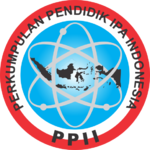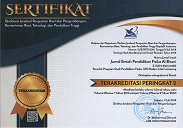Fostering 15–16-Year-Old Students’ Social Responsibility through a Physics E-worksheet: An ENACT Learning Model Intervention
Abstract
Education in the 21st Century significantly emphasizes developing key competencies, including social responsibility. However, a substantial gap persists between students' theoretical understanding of social responsibility and its practical application, particularly in physics education. This study aims to develop a physics student worksheet based on the ENACT (Engage, Navigate, Anticipate, Conduct, and Take Action) learning model to foster social responsibility among students aged 15 to 16. This study employed the Research and Development (R and D) methodology and adopted the Borg and Gall development model (stages 1–7), involving validation by media and content experts and a practicality assessment. The sample comprised two teachers and 127 students from two public schools in Bandar Lampung, with data collection techniques including structured interviews, observations, and Likert-scale questionnaires. Validation results indicated high quality, with 92% from media experts and 94% from content experts, while practicality assessments yielded scores of 93% from teachers and 89% from students, categorizing the worksheet as highly practical. The teachers and students provided positive feedback, highlighting the worksheet's ease of use, relevance, engaging content, and potential to cultivate social responsibility among students. This study contributes to integrating digital technology into physics education by underscoring the role of interactive learning tools in fostering social responsibility. However, further research is recommended to examine the effectiveness of ENACT-based e-worksheets in diverse educational contexts and across different subject areas.
Keywords
Full Text:
PDFReferences
Alsaeed, H. (2022). The Role of Public Education Schools in Developing Social Responsibility in the Light of Contemporary Global Trends. Creative Education, 13(09), 2754–2780. https://doi.org/10.4236/ce.2022.139174
Atmaja, D. Y. S., & Samsudin, A. (2024). Validity of the ‘Dunya Hejo (Du-Jo)’ Problem-Based Learning E- Worksheet on Climate Change and Global Warming. Online Learning in Educational Research, 4(4), 71–85.
Avianti, E. E., Ridho, Z. R., & Jember, U. (2023). Pengembangan E-LKPD Untuk Meningkatkan Argumentation Skills Siswa SMP Dalam Pembelajaran IPA. VI(2), 124–131.
Børsen, T., Antia, A. N., & Glessmer, M. S. (2013). A Case Study of Teaching Social Responsibility to Doctoral Students in the Climate Sciences. Science and Engineering Ethics, 19(4), 1491–1504. https://doi.org/10.1007/s11948-013-9485-9
Buğdayci, S. (2019). Examining personal and social responsibility levels of secondary school students. Universal Journal of Educational Research, 7(1), 206–210. https://doi.org/10.13189/ujer.2019.070126
Chen, L., & Lertamornsak, G. (2023). Internet of Things (IoT) based Investigation between Instructors’ Insight of Constructivist Learning Theory and Learners Performance analysis in Higher Vocational Accounting Training. International Journal on Recent and Innovation Trends in Computing and Communication, 11(6 s), 217–227. https://doi.org/10.17762/ijritcc.v11i6s.6824
Choi, Y., & Lee, Y. (2022). Secondary School Students ’ Understanding of Socioscientific Issues and Their Views on Social Responsibility of STEM Professionals Explored in ENACT Project. Journal of Research in Curriculum & Instruction, 26(6), 556–572. https://doi.org/https://doi.org/10.24231/rici.2022.26.6.556
Erna, M., Alimin, M., Lee, H., Suryawati, E., Albeta, S. W., & Priyambada, G. (2023). Enhancing Indonesian college students’ views of social responsibility of scientists and engineers: The enact model intervention. Eurasia Journal of Mathematics, Science and Technology Education, 19(3). https://doi.org/10.29333/ejmste/13000
Erna, M., Suryawati, E., Lee, H., Masnaini, & Albeta, S. W. (2022). Pedoman Penerapan ENACT Model. bukumaheswari.
Fadhila, A. N. (2022). Pengembangan E-LKPD Berbasis PBL Menggunakan Flip PDF Professional untuk Meningkatkan Literasi Sains pada Materi Medan Magnet. Nusantara: Jurnal Pendidikan Indonesia, 2(1), 53–70. https://doi.org/10.14421/njpi.2022.v2i1-4
Febriani, F., Ibnusaputra, M., Pradana, P. W., & Jumadi, J. (2022). Socioscientific Issues-based Guided-inquiry E-worksheet on Optical Instruments Topic. Jurnal Ilmiah Pendidikan Fisika Al-Biruni, 11(2), 231–241. https://doi.org/10.24042/jipfalbiruni.v11i2.12603
Fernandez, R. D. (2013). Teaching Social Responsibility – A need. Conference: Soft Skills and Employability.
Fonseca, I., Bernate, J., Betancourt, M., Barón, B., & Cobo, J. (2019). Developing social responsibility in university students. ACM International Conference Proceeding Series, 215–218. https://doi.org/10.1145/3369255.3369275
Hartanto, E. (2017). Perbedaan Skala Likert Lima Skala Dengan Modifikasi Skala Likert Empat Skala. Metodologi Penelitian, 2., September, 2–3. https://www.academia.edu
Hasanah, M. F. T. Y. S. D. (2021). Pengembangan E-LKPD Fisika dengan Model Project Based Learning pada Materi Rangkaian Listrik Arus Searah untuk Peserta Didik Kelas XII di SMA Negeri 1 Sedayu. COMPTON: Jurnal Ilmiah Pendidikan Fisika, Vol 8 No 1 (2021): COMPTON: Jurnal Ilmiah Pendidikan Fisika, 34–41. https://jurnal.ustjogja.ac.id/index.php/COMPTON/article/view/10469/4080
Hope, E. C. (2016). Preparing to Participate: The Role of Youth Social Responsibility and Political Efficacy on Civic Engagement for Black Early Adolescents. Child Indicators Research, 9(3), 609–630. https://doi.org/10.1007/s12187-015-9331-5
Hunjet, A., Jurinić, V., & Vuković, D. (2021). Environmental responsibility impact of corporate social. SHS Web of Conferences, 2(6013), 1–11. https://doi.org/https://doi.org/10.1051/shsconf/20219206013
Hwang, Y., Ko, Y., Shim, S. S., Ok, S. Y., & Lee, H. (2023). Promoting engineering students’ social responsibility and willingness to act on socioscientific issues. International Journal of STEM Education, 10(1), 1–16. https://doi.org/10.1186/s40594-023-00402-1
Hyunju, L., Yuhyun, C., Chang-Hoon, N., Seung-Yong, O., Shim, S. S., Hwang, Y., & Gahyoung, K. (2020). Development of the ENACT Model for Cultivating Social Responsibility of College Students in STEM Fields. Journal of Engineering Education Research, 23(6), 3–16.
Idowu, S., & Sitnikov, C. (2020). Essential Issues in Corporate Social Responsibility New Insights and Recent Issues: New Insights and Recent Issues. https://doi.org/10.1007/978-3-030-39229-1
Irwanto, I., Permata, E., Irwani, I., & Marliah, M. (2021). Implementasi multimedia pembelajaran biologi berbasis maromedia flash 8 untuk meningkatkan motivasi belajar siswa di SMAN 5 BAJO Sulawesi Selatan. Biodidaktika: Jurnal Biologi Dan Pembelajarannya, 16(1), 2527–4562. https://doi.org/10.30870/biodidaktika.v16i1.10738
Ismawati, E. Y., Khoiri, N., Saefan, J., Ristanto, S., Prakosa, H. A., & Ristianti, S. (2023). Pengembangan E-LKPD Berbasis Problem Based Learning Untuk Meningkatkan Kemampuan Pengambilan Keputusan Peserta Didik. Jurnal Inovasi Pembelajaran Di Sekolah, 4(2), 712–720. https://doi.org/10.51874/jips.v4i2.174
Laura, & Olivia. (2020). The Cambridge Life Competencies Framework : Social Responsibilities. Language Research Team, Cambridge University Press.
Lee, H., Yoo, J., Choi, K., Kim, S. W., Krajcik, J., Herman, B. C., & Zeidler, D. L. (2013). Socioscientific Issues as a Vehicle for Promoting Character and Values for Global Citizens. International Journal of Science Education, 35(12), 2079–2113. https://doi.org/10.1080/09500693.2012.749546
Lestari, N. A. P., Wahyuni, L. T. S., Lasmawan, I. W., Suastra, I. W., Dewi, M. S. A., & Astuti, N. M. I. P. (2023). Kurikulum Merdeka Sebagai Inovasi Menjawab Tantangan Era Society 5.0 Di Sekolah Dasar. Jurnal Ilmiah Pendidikan Citra Bakti, 10(4), 736–746. https://doi.org/10.38048/jipcb.v10i4.1996
Lubis, M. U., Siagian, F. A., Zega, Z., Nuhdin, N., & Nasution, A. F. (2023). Pengembangan Kurikulum Merdeka Sebagai Upaya Peningkatan Keterampilan Abad 21 Dalam Pendidikan. ANTHOR: Education and Learning Journal, 2(5), 691–695. https://doi.org/10.31004/anthor.v1i5.222
Macalalag, A. Z., Johnson, J., & Lai, M. (2020). How do we do this: learning how to teach socioscientific issues. Cultural Studies of Science Education, 15(2), 389–413. https://doi.org/10.1007/s11422-019-09944-9
Nenggala, M. P., Razi, P., Hidayati, & Sari, S. Y. (2024). Electronic Student Worksheet for Solving Problems in Physics Material Based on Problem-Based Learning. International Journal of Information and Education Technology, 14(7), 945–954. https://doi.org/10.18178/ijiet.2024.14.7.2121
Nikmatur Rohmaya, I Nyoman Suardana, & I Nyoman Tika. (2023). Efektifitas E-LKPD Kimia SMA/MA dengan Model Pembelajaran Berbasis Masalah Berkonteks Isu-isu Sosial Sains dalam Meningkatkan Literasi Sains Peserta Didik. JURNAL PENDIDIKAN MIPA, 13(1), 25–33. https://doi.org/10.37630/jpm.v13i1.825
Noormiati, Muhammad Zaini, & Karim. (2023). Desain dan uji coba e-LKPD IPA menggunakan liveworksheet untuk meningkatkan keterampilan berpikir kritis. Journal of Banua Science Education, 3(2), 127–134.
Nurmala, S., & Fatisa, Y. (2022). Desain dan uji coba e-LKPD ( elektronik - lembar kerja peserta didik ) berbasis SSCS (search, solve, create, and share ) pada materi hidrokarbon. Jurnal Tarbiyah Suska Conference Series (TSCS), 1, 170–178.
Ok, G., Ko, H., & Hwang, Y. (2021). A Case Study of an ENACT Model-based Engineering Design Online Course for Fostering Social Responsibility of Engineers. Journal of Engineering Education Research, 24(6), 3–19. https://doi.org/https://doi.org/10.18108/jeer.2021.24.6.3
Pratiwi, W., & Lestari, N. A. (2024). Validitas Lembar Kerja Peserta Didik (LKPD) Berbasis Problem Based Learning (PBL) Materi Pemanasan Global Untuk Meningkatkan Kemampuan Literasi Sains Fase E SMA/MA. Inovasi Pendidikan Fisika, 13(2), 79–85.
Puriasih, L. P., & Rati, N. W. (2022). E-LKPD Interaktif Berbasis Problem Solving pada Materi Skala dan Perbandingan Kelas V Sekolah Dasar. Jurnal Pedagogi Dan Pembelajaran, 5(2), 267–275. https://doi.org/10.23887/jp2.v5i2.48848
Purnamayanti, I. G. A., Suharta, I. G. P., & Astawa, I. W. P. (2023). Pengembangan E-LKPD Interaktif Berorientasi PMRI untuk Meningkatkan Kemampuan Pemecahan Masalah Matematika Siswa SMP Kelas IX. Jurnal Cendekia : Jurnal Pendidikan Matematika, 7(3), 3147–3158. https://doi.org/10.31004/cendekia.v7i3.2884
Putra, I. M. T. P., Sudiatmika, A. A. I. A. R., & Suardana, I. N. (2023). Effectiveness of E-LKPD IPA through Socioscientific Inquiry Based Learning (SSIBL) Model to Improve Students’ Scientific Literacy Skills. Jurnal Penelitian Pendidikan IPA, 9(8), 6337–6344. https://doi.org/10.29303/jppipa.v9i8.3957
Putri, W. A. S., Hakim, L., & Sulistyowati, R. (2022). Pengembangan E-Lkpd Materi Efek Doppler Berbasis Inkuiri Terbimbing Berbantuan Aplikasi Phyphox Untuk Meningkatkan Pemahaman Konsep Fisika. ORBITA: Jurnal Pendidikan Dan Ilmu Fisika, 8(1), 15. https://doi.org/10.31764/orbita.v8i1.6828
Rohmaya, N. (2022). Peningkatan Literasi Sains Peserta Didik Melalui Penggunaan E-LKPD Interaktif Berkonteks Socioscientific Issues. Madaris: Jurnal Guru Inovatif, 83–92.
Sadler, T. D., & Zeidler, D. L. (2005). Patterns of informal reasoning in the context of socioscientific decision making. Journal of Research in Science Teaching, 42(1), 112–138. https://doi.org/10.1002/tea.20042
Sugiyono. (2018). Metode Penelitian Pendidikan (Pendekatan Kuantitatif, Kualitatif, dan R&D). Alfabeta.
Sugiyono. (2019). Metode Penelitian dan Pengembangan. Alfabeta.
Temporin, S. (2014). Higher education and society in Tunisia: re-thinking university and students social responsibility. Hemispheres, 29(3), 85–102. http://search.proquest.com/docview/1676087643?accountid=17215%5Cnhttp://limo.libis.be/resolver?url_ver=Z39.88-2004&rft_val_fmt=info:ofi/fmt:kev:mtx:journal&genre=article&sid=ProQ:ProQ%3Aibssshell&atitle=Higher+education+and+society+in+Tunisia%3A+re-thinki
Tri Wahyuni, E., Supeno, S., & Singgih Budiarso, A. (2024). Pengembangan E-LKPD berbasis socio-scientific issue untuk meningkatkan kemampuan argumentasi ilmiah siswa pada pembelajaran IPA SMP. Eduproxima: Jurnal Ilmiah Pendidikan IPA, 3, 1155–1165. http://jurnal.stkippgritulungagung.ac.id/index.php/eduproxima
Widayanti, W., Yuberti, Y., Irwandani, I., & Hamid, A. (2018). Pengembangan Lembar Kerja Praktikum Percobaan Melde Berbasis Project Based Learning. Jurnal Pendidikan Sains Indonesia, 6(1), 24–31. https://doi.org/10.24815/jpsi.v6i1.10908
Wiliyanti, V., Destiana, A., & Shidqha, N. H. (2022). Development Massive Open Online Courses (MOOCs) Based on Moodle in High School Physics Static Electricity. Jurnal Pembelajaran Fisika, 10(1), 55–066. https://doi.org/10.23960/jpf.v10.n1.202206
Xu, X., Jing, R., & Lu, F. (2022). Environmental Regulation, Corporate Social Responsibility (CSR) Disclosure and Enterprise Green Innovation: Evidence from Listed Companies in China. International Journal of Environmental Research and Public Health, 19(22). https://doi.org/10.3390/ijerph192214771
Zahroh, D. A., & Yuliani. (2021). The development of scientific literacy based E-LKPD to train student’s critical thinking skills in growth and development materials. Berkala Ilmiah Pendidikan Biologi (BioEdu), 10(3), 605–616.
Zandvoort, H., Børsen, T., Deneke, M., & Bird, S. J. (2013a). Editors’ Overview Perspectives on Teaching Social Responsibility to Students in Science and Engineering. Science and Engineering Ethics, 19(4), 1413–1438. https://doi.org/10.1007/s11948-013-9495-7
Zandvoort, H., Børsen, T., Deneke, M., & Bird, S. J. (2013b). Editors’ Overview Perspectives on Teaching Social Responsibility to Students in Science and Engineering. In Science and Engineering Ethics (Vol. 19, Issue 4, pp. 1413–1438). Kluwer Academic Publishers. https://doi.org/10.1007/s11948-013-9495-7
Zeidler, D. L. (2011). Global sustainability and public understanding of science: The role of socioscientific issues in the international community. Asia-Pacific Forum on Science Learning and Teaching, 12(1), 1.
DOI: http://dx.doi.org/10.24042/jipfalbiruni.v13i2.24265
Refbacks
- There are currently no refbacks.

Jurnal ilmiah pendidikan fisika Al-Biruni is licensed under a Creative Commons Attribution-ShareAlike 4.0 International License.
![]()







